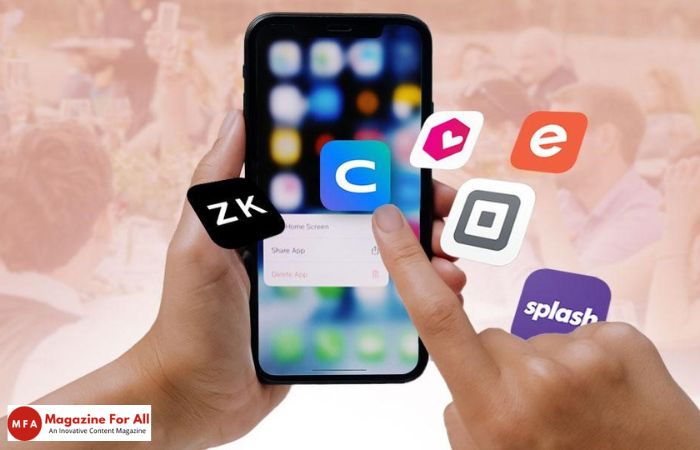You need more than just the ideal event management software to succeed in the event management sector. You should also keep a close watch on technological advancements that can potentially disrupt industry standards and practices. Every year smartphone software changes by the latest trends and in 2024 we will see progress in the following directions.
Table of Contents
Wearable Tech
Smartwatches no longer simply provide owners with a convenient device to monitor their heart rate. Instead, they offer immense value to enhance the event experience, whether you’re attending concerts, art festivals, or business conferences.
Wearable tech allows you to enjoy faster and more seamless check-ins, receive real-time updates on your tickets and accommodations, and instantly receive instructions from organizers. It keeps digital payments secure and helps you navigate your way to your seats or booths at conferences, ensuring convenience and satisfaction.
By connecting your wearable device through event booking software or an app, you don’t have to worry about forgetting tickets or searching your pockets for stubs. Your wearable device provides all the information you need for quick access, entry, and assistance. This also reduces your reliance on your smartphone, allowing you to fully focus on the event and the unique experience it offers.
AR and VR for Events
AR has gained immense popularity as an entertainment medium. You can interact with virtual environments and objects using smartphones and other devices. Businesses are utilizing this technology to enhance customer service, provide additional information, and even sell products.
VR is also becoming a prominent trend in the event industry. It’s gaining quick popularity by offering event guests a realistic view. With VR headsets, you immerse yourself in a different world, seeing things others can’t and feeling like you’re there. Apart from creating a more immersive experience, VR also presents a unique opportunity to engage customers in ways that were previously impossible.
Facial Recognition
Facial recognition may not be a groundbreaking innovation, but it’s steadily gaining favor within the event management industry due to its numerous advantages. Combining this technology with event management software and CRM solutions enables faster registration and profiling. Moreover, it allows for the swift identification of VIPs and special guests and facilitates personalized services and perks. By integrating facial recognition into existing security protocols, event organizers and security personnel can ensure the safety of both the venue and attendees, thus addressing on-site security challenges effectively.
Live Streaming Events
You are witnessing a rise in the number of people who watch live streams online, with companies also adopting live-streaming technology to promote their products and services. Most of these streams take the form of events. We expect this trend in the events industry to continue through 2024.
Millennials and Gen Z are more inclined than older generations to attend events and engage with brands. They also display a higher level of receptiveness to new experiences and innovative ideas. This plays a significant role in the growing interest of renowned brands to collaborate with digital influencers rather than relying on traditional advertising channels like magazines or billboards.
5 AI Tools
You can utilize ChatGPT, a powerful language model (LLM), to generate human-like text in response to your prompts. This AI tool empowers you to come up with event topic ideas, structure agendas, and brainstorm ice-breaking games. Event coordinators can leverage ChatGPT to compose email invitations, select speakers, and choose event venues.
As these AI tools continue to advance in their interactions with humans, they enable you to engage with event attendees by answering questions, providing detailed product information, and conducting interactive demos.
Event management now involves the use of a large number of applications and data. In this matter, you cannot do without a cleaner app, which will allow you to quickly get rid of unnecessary things. There are many similar applications on the Apple Store, but this cleaner works better than others. Using the phone app, you can find and delete similar pictures, and videos, get rid of temporary files, and compress those files that will be useful to you.
6 Contactless Check-In
You have surely encountered those never-ending lines and congested passages at the entrance of physical events. Fortunately, the implementation of facial recognition technology streamlines on-ground event management by reducing these queues. When you register for an event, simply capture and upload your picture. This picture will be utilized to identify you and grant access during check-ins, resulting in significant time savings.
Event Chatbots
You may encounter errors, technical glitches, and problems at any point during your entire event attendee journey. To address this, set up a system where you can resolve attendee queries regarding their registrations, ticketing, and other issues using event chatbots. These chatbots can be integrated with your mobile event app or specifically designed systems. Additionally, you can use WhatsApp automation to assist without any human intervention, offering pre-defined solutions. This approach will ensure that you, as an attendee, feel valued and appreciated.
Conclusion
According to Research and Markets’ forecast, you can expect the event management software sector to grow to $11.4 billion by the end of 2024. However, success is not guaranteed by simply using the best event management software.
Besides the aforementioned trends, you should also keep an eye on emerging developments such as virtual and augmented reality, blockchain technology, and cryptocurrency. The event management industry is constantly shaped by the rapid evolution of technology. It wouldn’t be surprising if new trends arise next year to reshape the industry just as the current ones are doing.
Related Post: Employee Engagement Software for the Gig Economy
































































